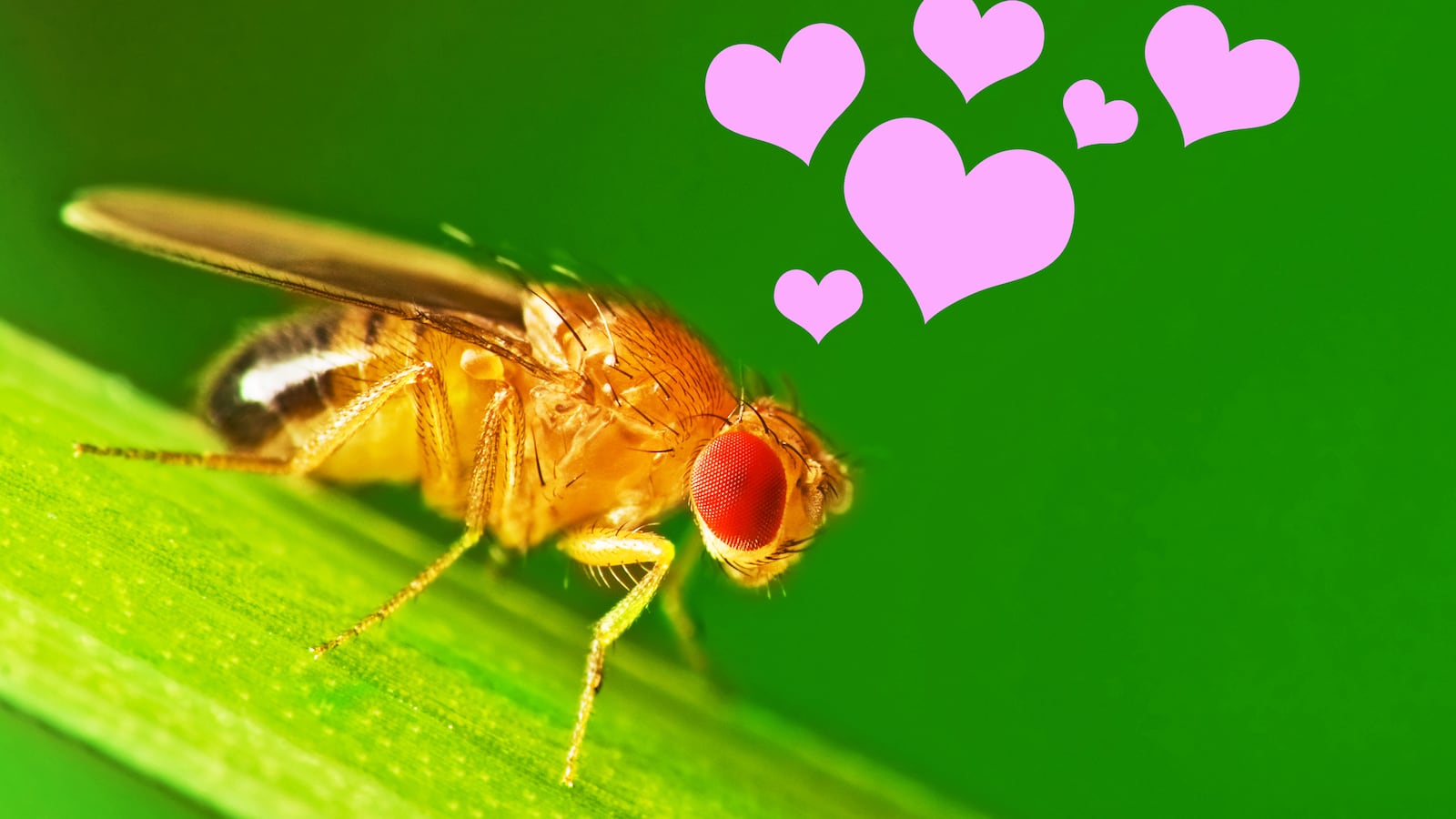This weekend, many thousands of sleepy women will submit to their male partners’ prodding, middle-of-the-night sexual advances—begrudgingly, at first, then perhaps with unexpected enthusiasm.
When they wake up possibly tired and contemptuous of the prodder who disturbed their rest, they may curse the patriarchy. They may blame their submissive swoons on a combination of sexist conditioning and toxic masculinity, because they are enlightened feminists.
But biology offers another explanation that could take the edge off these morning-after moods.
A new study of male and female fruit flies has found that females are receptive to sexual advances even when sleep-deprived. Males, by contrast, are less likely to court females when sleep-deprived, according to the study, which also found that males are less likely to sleep when aroused.
Published Friday in the Nature Communications journal, the study suggests that the circle of fruit fly life depends on male desire being adequately sated. And its findings about fruit flies’ sleep and sex patterns may shed light on why—and when—men and women choose sleep over sex, and vice versa.
This is partly because there is a “tremendous similarity” in the genes of human beings and fruit flies, according to Michael Nitabach, the study’s lead author and a professor of genetics and cellular physiology at Yale University.
In addition to gene similarities, fruit flies engage in numerous behaviors that human beings and other mammals engage in, including sex, sleep, learning, memory, sensory experience, and decision making.
The fruit fly is also a “useful model organism for understanding the neural control of behavior,” said Nitabach. “They have an extensive collection of powerful genetic tools, like those we used in this study, for manipulating and measuring function in specific subsets of neurons involved in particular behaviors.”
Nitabach’s latest study backs up previous fruit fly research: genes already identified in prior studies as important for distinguishing “male and female sex differences in anatomy, physiology and sexual behavior are also important for determining sex differences in sleep,” he said.
Sexual similarities between fruit flies and humans extend well beyond how arousal affects their sleep.
Male fruit flies have a habit of chasing their pray like adolescent boys, and they engage in a kind of seduction dance that involves extending and “vibrating” a single wing, according to Nitabach, before mounting. The mating process lasts 15 to 25 minutes, beginning with chase and finishing when the male, well, finishes.
Nitabach and his colleagues measured the flies’ sexual activity by placing a male and female together “in a chamber about a half inch in diameter” and video-taping their behavior, he said. Extended periods of immobility determined when the flies had fallen asleep, exhausted from exertion.
“We used sophisticated genetic tools to make small numbers of specific neurons whose activity determines sex drive sensitive to temperature,” said Nitabach. “When we then elevated the temperature, this activated these sex-drive neurons. We then measured sleep of these flies with activated sex-drive neurons and found that in males sleep was substantially reduced.”
Nitabach’s study found that sex-drive neurons suppress sleep in male flies, and sleepiness suppresses their sex drive. This discovery paves the way for future studies to “explore details of the connection between sex-drive and sleep-control neurons,” according to Nitabach, and “for further analysis of exactly how these genes regulate sleep.”
Nitabach also said that sleep and sex patterns identified in male and female fruit flies may indeed apply to men and women, but confirming this hypothesis “would require further experimentation.”
The male fruit fly has a prodigious sperm count: the size of their ejaculate makes them “record holders” among animal species, according to a 2016 study at the University of Zurich. While the fruit fly is “only a millimeters long, its sperm reach an impressive length of almost six centimeters,” according to the study’s author.
The cold, biological truth is that fatigue doesn’t make female fruit flies any less receptive to sex because they can’t afford to pass up an opportunity to reproduce. Tired male fruit flies, by contrast, are less likely to seduce because they can’t get it up to perform.
It’s not an empowering feminist narrative. But it should deter women from flagellating themselves after succumbing to their partner’s advances. Their submissive, middle-of-the-night swoons may have nothing to do with being weak-willed or conditioned to please men. It’s just science.






